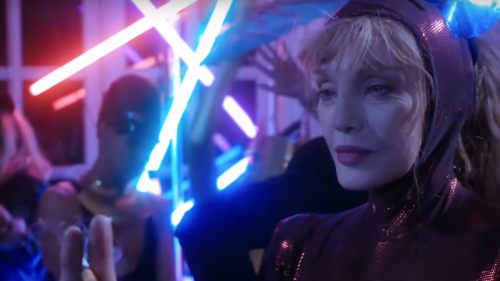Fantasia 2019 Review: DREADOUT Could Have Dreaded Further Out
I haven’t played Dreadout, the Fatal Frame-inspired, Indonesian-made, streaming-friendly video game upon which Dreadout, the Dreadout-inspired, Indonesian-made, streaming-bound movie, is based. I also haven’t played its sequel. But I have seen Kimo Stamboel’s movie adaptation, and not only does it feel like a survival horror game at times, it’s got all the problems found in many survival games - plus a few extra of its very own.
Dreadout follows a group of older teens desperate for their social-media accounts to go as viral as their younger-teen nemeses’. That’s certainly an apt motivation, given the game’s success on YouTube, if not a particularly universal one. It’s also debatable as to whether it’s enough of a motivation to do the things that they end up doing. Set on making the spookiest livestream possible, they make for an abandoned apartment complex, breaking into the nearest police-cordoned unit they can find. It’s there that they discover an ancient manuscript bearing writing only Linda, the youngest of their number, can see, and soon enough, they’ve opened up a portal to an alternate realm.
What they find on the other side of that portal is significantly tamer than the horrors the video game threw at its players. Both versions play with Indonesian folklore in the monsters they portray, but the film only really has a few entities to offer - a pack of zombies, a sickle-wielding mummy, and a demonic “Red Woman” obsessed with reclaiming a particular magical dagger. It’s a revenge story with little emotional heft, linked to protagonist Linda only through a mystical, forgotten family connection, and it’s essentially a vehicle through which to deliver some spook-a-blast nonsense.
That’d be just dandy, were the spook-a-blast nonsense worthwhile in and of itself. Dreadout feints at many horror traditions, but never quite does any of them the justice it clearly wants to do. Stamboel delivers some decent possession antics, with a couple members of the cast flexing solid demonic chops; first-person found-footagey livestream sequences evoke the survival-horror game atmosphere; and if you like characters flying through the air via demonic telekinesis, this is your movie. There are decent momentary scares here and there, and a couple sequences are genuinely intense.
Dreadout is trapped between two different approaches to mystical horror. On one hand, there’s a clear fondness for Evil Dead-style anything-goes scares on display, and protagonist Linda is certainly put through the horror wringer. But the movie also seems desperate to establish the rules of its universe(s), which both aren’t clear and disagree with the Raimi-esque approach anyway. The characters spend an inordinate amount of time working out the logic and motivations of the demonic antagonist, yet they shrug off a surprising quantity of weird shit, their performances failing to adequately sell the scares. When zombies appear in the final act, the characters’ response is to say “damn, zombies!”. That's a fair representation of the movie as a whole.
Dreadout’s biggest concession to its video-game roots lies in its use of smartphone cameras. That’s the central mechanic of the video game, in which players can only ward off monsters by blindsiding them with their camera flash, and it comes up here too. But stripped of the game’s interactivity, the first-person phone-camera sequences just play as stock found footage horror, with a touch of screenlife via livestream comments. Linda’s use of her camera flash as a weapon, too, comes off as a little bit silly in the movie: every encounter plays out exactly the same, with Linda frantically tapping her phone screen at the last minute. At least that element justifies the characters continuing to film even when being terrorised in an alternate dimension.
If only that alternate dimension had some sense of otherworldliness about it. This isn’t a Silent Hill or Stranger Things situation, where the very texture of the world changes. It’s more like an ordinary forest and a fairly ordinary house/shrine, occupied by supernatural creatures that show the film’s budget constraints (none of the game’s more animalistic beasts show up here). There’s also some shockingly amateurish visual effects work going on; just as you’re marveling at the great makeup work on the Red Woman’s demon-teeth, she goes and does that one After Effects jaw-unhinging effect you’ve seen in countless YouTube videos.
Despite all of this, Dreadout is still probably one of the more-serviceable video game adaptations out there - as low a bar as that is. It doesn’t hew slavishly to its source material, instead nabbing key elements - schoolkids, phones, Indonesian demonology - and spinning a new story to unite them onscreen. Stamboel could have gone further with his horror antics, but the intent is certainly there, stymied most likely by budget limitations. What he’s turned in is probably of greatest interest only if you’re a fan of the game, and in that sense, it’s fine. But it is only fine, and horror fans will likely be left wanting a little more dread.



